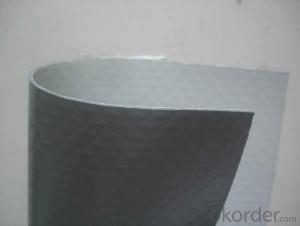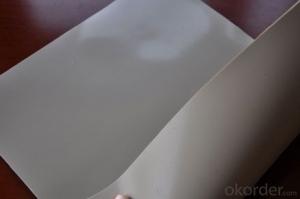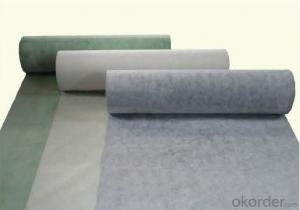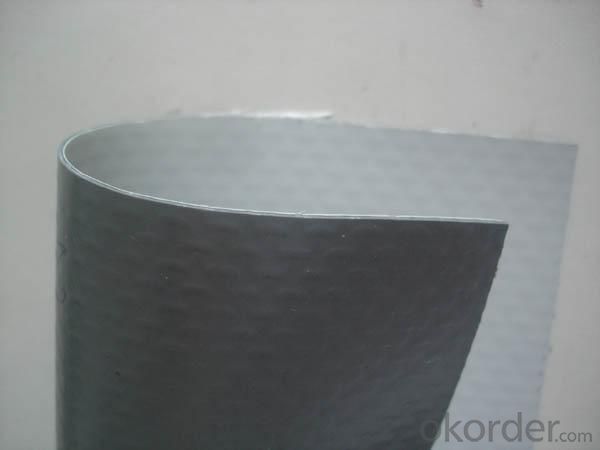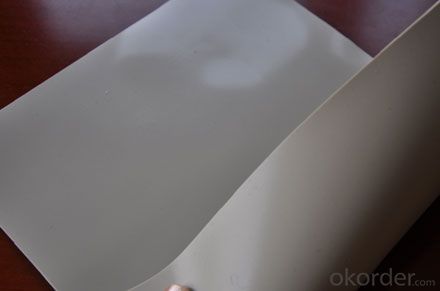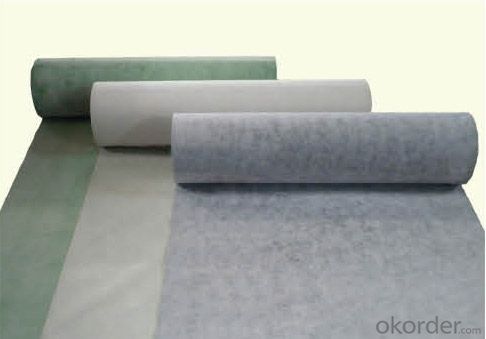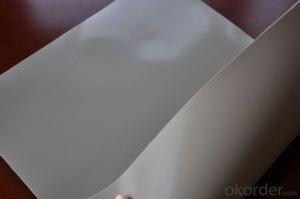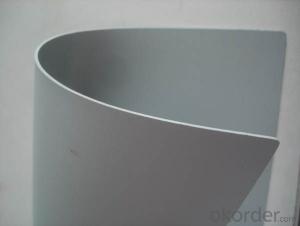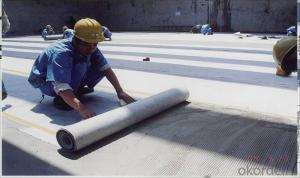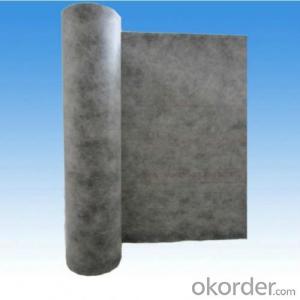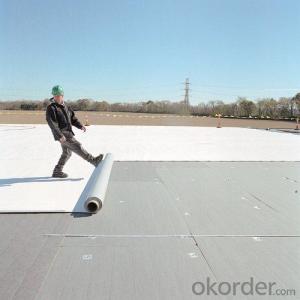PVC Plastic High Polymer Waterproofing Membrane
- Loading Port:
- China main port
- Payment Terms:
- TT OR LC
- Min Order Qty:
- 5000 m²
- Supply Capability:
- 100000 m²/month
OKorder Service Pledge
OKorder Financial Service
You Might Also Like
Specification of PVC Waterproofing Membrane
Length | 20m/roll or customized |
Width | 2.05m |
Thickness | 1.2mm; 1.5mm; 2.0mm |
Type | Homogeneous, Reinforced, Fabric back |
If Exposed | Exposed and Non-exposed |
Color | White, Grey or customized |
Introduction of PVC Waterproofing Membrane
The PVC waterproofing rolls formulas are based upon polyvinyl chloride resin with other assistants added to provide flexibility and stability such as anti-oxidant,absorbent of ultraviolet light, plasticizer and plastic filling agent.
Divided by the product composition: homogeneous non-composite membranes (code H), with fiber composite backing sheet (code L), fabric reinforced sheet (code P), glass fiber reinforced membrane within (code G), glass fibers increased with fiber composite backing sheet (code GL
Sheets of single-layer and laminated sheets with fibre felt or fibre as reinforced layers are supplied in our company.
Width : 1-2.0m
Thickness : 1.2mm 1.5mm 1.8mm 2.0mm
Length: 15m 20 m 25m
Features of PVC Waterproofing Membrane
1) Excellent aging resistance. Service life of roofing material is over 20 years;
service life of underground material is over 50 years.
2) Root resistant penetration, specially used on planting roof.
3) Welding installation. Joints are solid and environment friendly, no pollution.
4) High tensile strength, good elongation and dimensional stability.
5) Good plasticity, easy and suitable for details installation.
6) Fireproof. Fire extinguished out of the ignition resource.
7) Surface is smooth, no fading and dirty resistant.
FAQ of PVC Waterproofing Membrane
a.Can we get some samples before place order?
Answer: We can send the free samples to you by freight collect.
b.How many years can your PVC membrane guarantee?
Answer: We will guarantee the quality for 5 years at least.
c.Which countries you ever export the product?
Answer: We export the PVC membrane to South Africa, Middle east and even European countries.
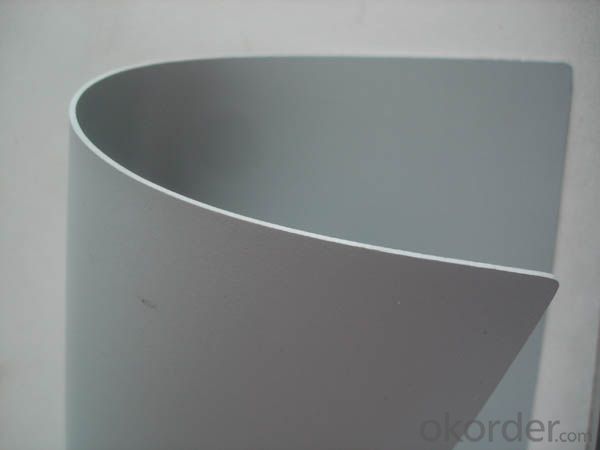
- Q: Can a waterproofing membrane be used in conjunction with paint or coatings?
- Yes, a waterproofing membrane can be used in conjunction with paint or coatings. The membrane provides a barrier against water intrusion, while the paint or coatings provide additional protection and aesthetic appeal.
- Q: What materials are commonly used for waterproofing membranes?
- There are several materials commonly used for waterproofing membranes, each with their own unique properties and advantages. Some of the most commonly used materials include: 1. Bitumen: Bitumen is a popular choice for waterproofing membranes due to its excellent waterproofing properties. It is a viscous, black, and sticky substance derived from petroleum, and it is often mixed with polymers to enhance its flexibility, durability, and resistance to UV radiation. 2. PVC (Polyvinyl Chloride): PVC membranes are highly durable and resistant to chemicals, making them suitable for various waterproofing applications. They are easy to install and can withstand extreme temperatures, making them popular for flat roofs and underground structures. 3. EPDM (Ethylene Propylene Diene Monomer): EPDM is a synthetic rubber membrane that is highly flexible and durable. It is resistant to UV radiation, ozone, and extreme temperatures, making it suitable for both above and below-ground applications. EPDM membranes are commonly used for roofs, foundations, and pond liners. 4. TPO (Thermoplastic Olefin): TPO membranes are a blend of rubber and plastic polymers, making them highly flexible, durable, and resistant to UV radiation. They are lightweight and easy to install, making them popular for commercial roofing applications. 5. HDPE (High-Density Polyethylene): HDPE membranes are made from high-density polyethylene and are known for their excellent chemical resistance. They are commonly used for waterproofing underground structures, such as tunnels and basements. 6. Bentonite: Bentonite clay is a natural material that swells when exposed to water, forming a gel-like substance that seals cracks and pores. Bentonite membranes are often used for waterproofing below-ground structures and are particularly effective in preventing water infiltration. 7. Liquid applied membranes: These membranes are typically made from a combination of synthetic polymers and rubber. They are applied as a liquid and form a continuous, seamless, and flexible waterproofing layer when cured. Liquid applied membranes are versatile and can be used for various applications, including roofs, balconies, and foundations. It's important to note that the choice of material depends on the specific requirements of the project, including the type of structure, environmental conditions, and budget. Consulting with a waterproofing professional is recommended to determine the most suitable material for a particular application.
- Q: Can waterproofing membranes be used on mechanical rooms?
- Yes, waterproofing membranes can be used on mechanical rooms. Mechanical rooms often house equipment such as boilers, pumps, and ventilation systems, which can be sensitive to water damage. Waterproofing membranes provide a protective barrier against water infiltration and can help prevent leaks, moisture buildup, and potential damage to the equipment. Additionally, these membranes can also provide thermal insulation, noise reduction, and fire resistance properties. It is important to choose the appropriate type of waterproofing membrane based on the specific needs and requirements of the mechanical room.
- Q: Can a waterproofing membrane be applied over existing waterproofing layers?
- Yes, a waterproofing membrane can be applied over existing waterproofing layers. However, it is important to assess the condition of the existing layers to ensure they are sound and can provide a proper substrate for the new membrane. Additionally, proper surface preparation and compatibility between the existing layers and the new membrane should be considered to ensure a successful and long-lasting waterproofing system.
- Q: Can a waterproofing membrane be used on retaining walls?
- Yes, a waterproofing membrane can be used on retaining walls. Waterproofing membranes are commonly applied to retaining walls to prevent water penetration and potential damage to the structure. They help create a barrier that prevents moisture from seeping into the wall and causing erosion, cracking, or weakening of the materials.
- Q: Can a waterproofing membrane be used for green roofs?
- Yes, a waterproofing membrane can indeed be used for green roofs. Waterproofing membranes are commonly used as a crucial layer in green roof construction to prevent water leakage and protect the underlying structure. It provides an effective barrier against water infiltration, ensuring the green roof system remains watertight and preserving the integrity of the building.
- Q: Can a waterproofing membrane be used for plant rooms and mechanical equipment areas?
- Yes, a waterproofing membrane can be used for plant rooms and mechanical equipment areas. These areas often require protection from water and moisture damage, and a waterproofing membrane can provide an effective barrier to prevent leaks and water infiltration.
- Q: Is a waterproofing membrane resistant to UV radiation?
- Yes, a waterproofing membrane is typically resistant to UV radiation. Most waterproofing membranes are designed to be durable and long-lasting, and part of that includes being able to withstand exposure to UV rays. UV radiation from the sun can cause degradation and damage to various materials over time, including waterproofing membranes. However, manufacturers often incorporate UV stabilizers and additives into the membrane's composition to enhance its resistance to UV radiation. These additives help to prevent the breakdown of the membrane's structure, ensuring that it remains effective in preventing water infiltration and maintaining its overall performance for an extended period, even when exposed to direct sunlight. Additionally, some waterproofing membranes may have a protective layer or coating that offers additional UV resistance. It is always recommended to consult the manufacturer's specifications and guidelines to understand the specific UV resistance capabilities of a particular waterproofing membrane.
- Q: Can a waterproofing membrane be installed in areas with high humidity?
- Yes, a waterproofing membrane can be installed in areas with high humidity. In fact, high humidity can be a contributing factor to the need for waterproofing as it can lead to moisture buildup and potential water damage. Waterproofing membranes are designed to create a barrier against water penetration, regardless of the humidity levels in the area. However, it is important to ensure that the membrane is properly installed and sealed to prevent any moisture from seeping through. Additionally, it may be necessary to take extra precautions in areas with high humidity, such as using a moisture barrier or dehumidifiers, to further protect against potential water damage.
- Q: Can a waterproofing membrane be used for water treatment plants?
- Indeed, water treatment plants can benefit from the utilization of waterproofing membranes. These specialized membranes are specifically engineered to impede the flow of water, making them an ideal solution for safeguarding against water seepage in diverse structures, including water treatment plants. By applying these membranes to various sections of the facility, such as tanks, reservoirs, pipes, and basements, infiltration of water can be effectively prevented, thus shielding the infrastructure from potential harm. Furthermore, the implementation of waterproofing membranes aids in preserving the integrity of the water treatment process by ensuring that water remains confined within designated areas and does not permeate the surrounding soil or structures.
Send your message to us
PVC Plastic High Polymer Waterproofing Membrane
- Loading Port:
- China main port
- Payment Terms:
- TT OR LC
- Min Order Qty:
- 5000 m²
- Supply Capability:
- 100000 m²/month
OKorder Service Pledge
OKorder Financial Service
Similar products
Hot products
Hot Searches
Related keywords
